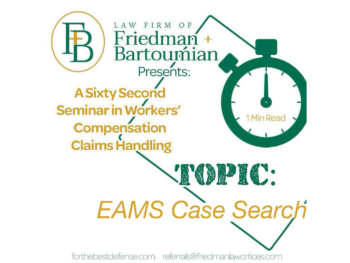Sadly, even though opioid prescriptions have significantly decreased over the past two years, the number of drug overdose deaths occurring in the United States each year are at epidemic levels. Overdose death attributed to prescription drugs in 2019 was recorded at a staggering 70,639. In 2020 the number of deaths increased to 91,799, then to 105,455 in 2021, and to 107,941 in 2022. The purpose of our blog today is to provide claims handling tips when an injured worker dies from a drug overdose.
On 5/28/2015, the California Supreme Court in South Coast Framing Inc. v. Workers Compensation Appeals Board, 61 Cal.4th 291, clarified our industrial laws concerning death claims. The court ruled that if medication prescribed for an industrial injury “contributed” in any manner to an employee’s death than the entire death is considered compensable. Contribution need not be substantial or material to render the death compensable.
The key element in the Supreme Court’s ruling describes how industrial medication must have “contributed” to the death, even if the contribution is less than 1%. Keep in mind the mere presence of industrial medication in the body does not necessarily mean it contributed to the death.
The role medication plays, if any, is to be determined by a physician, with the burden of proof resting with the party seeking benefits. Again, we must emphasize that just because an industrial prescribed medication is “present” in the body does not mean it “contributed” to death. Unfortunately, one major insurance company recently paid $320,000 in death benefits because a certain stomach medication prescribed for an industrial injury was listed in the autopsy report as being present in the decedent’s body, even though the cause of death was attributed to an opioid overdose unrelated to the work comp claim. The insurance company failed to solicit a QME opinion as to whether the industrial stomach medication contributed to the employee’s death. Instead, they misinterpreted the South Coast Framing decision and mistakenly believed that if a prescribed drug for an industrial injury was listed in the autopsy report as being present in the body at the time of death, then the claim was compensable. They proceeded to voluntarily pay $320,000 to settle the case.
Death claims can be very complicated to handle. We at Friedman + Bartoumian are experts in these matters and invite you to partner with us in your death claims to mitigate or eliminate liability.


Leave a Reply